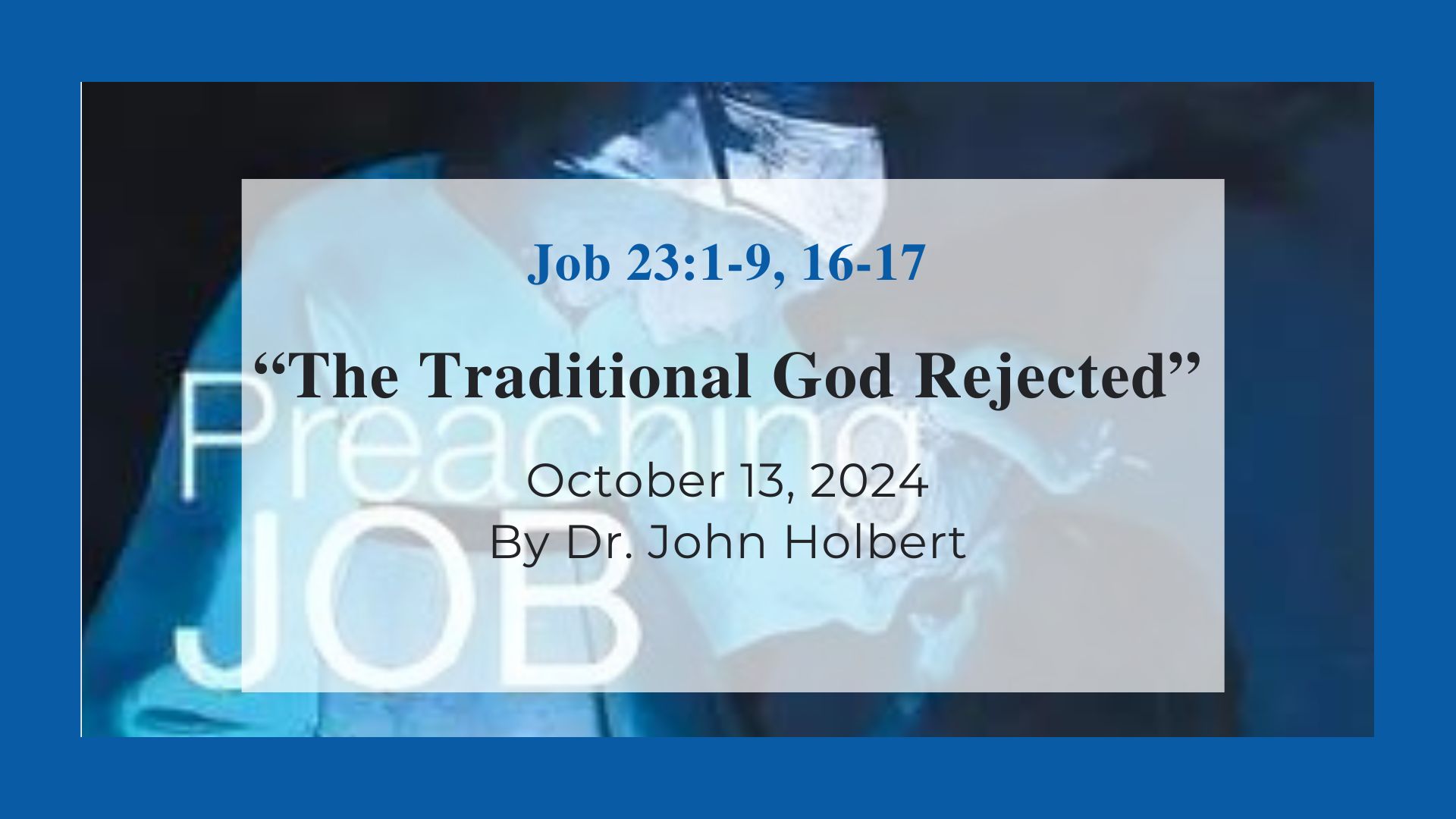The Traditional God Rejected - Reflections on Job 23:1-9, 16-17, Proper 22 Year B
by John Holbert on Monday, October 7, 2024

Proper 23. October 13, 2024. Job 23:1-9, 16-17. “The Traditional God Rejected”
Last week in our initial look at the long tale of Job, I suggested that one major theme of this work is the question of the nature of God. In chapter 1, Job revealed his view of God when he extravagantly sacrificed to his God whenever any of his children in Job’s imagination might have, even silently, cursed God. This sacrificial practice indicated that Job imagined a God who needed to be assuaged, bought off, propitiated lest that God release divine anger against any who fail to knuckle under to a God ever-ready and eager to demonstrate overpowering wrath. In chapter 2, the Satan suggests the same idea as he says that the only reason Job does not curse God is because God has protected him and all he has with a protective hedge. Take the hedge away, roars the Satan, and Joban curses are sure to follow.
But here in Job 23, after a long and increasingly blistering dialogue between Job’s three “friends,” men who are convinced that Job must have sinned to have received such appalling attacks from God—that is the way the universe works, they believe—and Job who is ever more reluctant to accept his former theological views, and now rails against a God he does not understand nor can see at all.
“Right now my complaint is defiant!
God’s hand lies heavy despite my groaning” (Job 23:2)
The Job who in chapter 1 responded to the loss of his livelihood and his family with a potent statement of traditional piety (Job 1:20-21), now “complains” (a noun based on a very familiar courtroom word of accusation) in sharp defiance (NRSV’s “bitter” misses the sharp accusatory nature of the word). And beyond that defiance, Job “groans,” apparently in an attempt to elicit from God some kind of sympathy; instead God continues to press down the sufferer.
And then Job returns to a cry that he has uttered before:
“If only I knew where to find God,
to come to the place of God’s dwelling!
I would lay out my case,
and fill my mouth with arguments.” (Job 23:3-4)
Here is genuine defiance! “Shall we accept good at the hands of God and not accept the bad,” Job had said at the end of chapter 2 to his despairing wife. But now, as he shouted at length in Chapter 9, he wants a meeting with God in a court of law where Job will strut and argue with God, who will be in the dock, accused of mismanaging the universe! It is a wildly imaginative hope, and flies well beyond the traditional view of God Job once held, but which he hhas now clearly abandoned.
And in the courtroom with God, Job makes it clear that God would put away divine power and would pay careful attention to Job’s statements of human reality.
“There an upright person (see Job’s description, using this word in Job 1:1, 8) could reason with him!
I would be acquitted forever by my judge!” (Job 23:7)
Job had claimed in earlier dialogic debate with the friends that their simplistic notion that God rewards the righteous and punishes the wicked is proven false again and again by the actuality of human experience. In Job 21 Job offers a terrifying glance at the world as he sees it:
“Why do the wicked live on,
reach old age, and grow mighty in power?
Their children are fixed before them,
their offspring before their eyes.
Their houses are safe from fear,
and no divine rod falls on them” (Job 21: 7-9)
Job had turned toward the idea of a confrontation with God, a meeting in court where God will be proven wrong, especially in the case of Job, who is innocent, and who has thereby not deserved the horrors he has witnessed in his own life, the destruction of that life in every respect.
Job ends this demand for a meeting in abject despair:
“God has made my heart faint;
Shaddai has terrified me!
I am not hidden away from darkness,
my face the gloom has covered.” (Job 23:16-17)
Though the text here is not well preserved, we may conclude that Job is anxious for a divine confrontation, but hardly finds such an event likely. Instead, God continues to terrify him with unsubtle power, bringing only darkness and gloom into his life.
It is plain that the tale longs for some sort of resolution. Job and his friends have spoken about God for chapter after chapter, but only Job has demanded a response from that God. Finally, in chapter 38 he will receive one, but whether or not it is the one Job, or we, expected remains to be seen.
